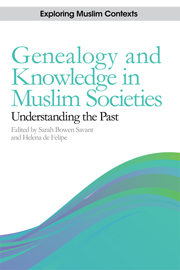Book contents
- Frontmatter
- Contents
- List of Figures and Tables
- Introduction
- Part One The Generation of Genealogical Knowledge
- Part Two Empowering Political and Religious Elites
- Part Three Genealogy as a Source for Writing History
- 7 Was Marwan ibn al-Hakam the First “Real” Muslim?
- 8 Genealogy and Ethnogenesis in al-Mas‘udi's Muruj al-dhahab
- 9 Genealogical Prestige and Marriage Strategy among the Ahl al-Bayt: The Case of the al-Sadr Family in Recent Times
- About the Contributors
- Index
8 - Genealogy and Ethnogenesis in al-Mas‘udi's Muruj al-dhahab
from Part Three - Genealogy as a Source for Writing History
Published online by Cambridge University Press: 05 September 2014
- Frontmatter
- Contents
- List of Figures and Tables
- Introduction
- Part One The Generation of Genealogical Knowledge
- Part Two Empowering Political and Religious Elites
- Part Three Genealogy as a Source for Writing History
- 7 Was Marwan ibn al-Hakam the First “Real” Muslim?
- 8 Genealogy and Ethnogenesis in al-Mas‘udi's Muruj al-dhahab
- 9 Genealogical Prestige and Marriage Strategy among the Ahl al-Bayt: The Case of the al-Sadr Family in Recent Times
- About the Contributors
- Index
Summary
In the tenth century, the litterateur and historian al-Mas‘udi (d. 345/956) composed one of the most eclectic accounts of the origins of the Persians surviving today. He begins his discussion of the subject in his Muruj al-dhahab wa-ma‘adin al-jawhar with the statement that “the people have disagreed with one another regarding the Persians (al-Furs) and their genealogies (ansābihim)”, and then proceeds to place on apparently equal footing a number of theories, including some that are evidently pre-Islamic in origin and some arising after the emergence of Islam. He positions his discussion of the Persians' genealogy amidst sections on Iranian history, both ancient and Sasanian (224–651 CE), but makes virtually no effort to reconcile the contradictions in his material. Some years later, he draws on this material again in his Kitab al-Tanbih wa-l-ishraf. What, then, is al-Mas‘udi doing in the Muruj? Why does he bring together such evidently disparate statements – and is there anything that he seeks to show through this?
In what follows, I review this section of the Muruj and then consider al-Mas‘udi's arrangement of the evidence and his likely sources and motives. Al-Mas'udi presents a remarkable picture of Islamisation in progress, including traces of negotiations over Iranians' sense of history. But I think we also have in his book a subtle but persuasive strategy for opposing Iranians' growing cultural confidence and autonomy.
- Type
- Chapter
- Information
- Genealogy and Knowledge in Muslim SocietiesUnderstanding the Past, pp. 115 - 130Publisher: Edinburgh University PressPrint publication year: 2014



